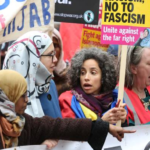The Southport Tragedy | Unfounded Blame on Muslims | and Its Aftermath
Why did the killing of children in Southport by a Welsh-born UK National lead to violence?
On 29 July, a horrific event unfolded at a Taylor Swift-themed dance and yoga event in Southport, leaving three young girls—Bebe King, six, Elsie Dot Stancombe, seven, and Alice da Silva Aguiar, nine—tragically murdered from a knife attack executed by a Welsh-born UK Terrorist. Eight more children and two adults were injured in this act of horrific terror. The nation was left in shock and grief, but what followed was a stark reminder of the pervasive Islamophobia in England.
The police swiftly arrested a 17-year-old from a nearby village and clarified that the incident was not terror-related. Despite this, social media was soon ablaze with false claims that the attacker was an asylum seeker, with an unfounded narrative that he was Muslim. In reality, the suspect was a Welsh-born lad of Rwandan descent.
How Did Misinformation Spread So Quickly?
False information spread like wildfire. Within hours, posts speculated that the suspect was an asylum seeker who arrived in the UK by boat in 2023, with incorrect names and baseless claims about his religious background. The BBC and other media took their sweet time to set the record straight, and the intended damage was done.
Muslim property in England was destroyed and sacred places of worship were set ablaze all on the acts of a Christian terrorist that were pasted on the innocent Muslims. The English folks were quick to execute further acts of terror on the Muslim minority while the authorities did little to help.
How did it all happen?
The Vigil and Subsequent Violence
A vigil held the following evening saw over a thousand people come together to mourn the victims. However, the peace was short-lived. Violence erupted near a local mosque, with bricks, bottles, and other missiles thrown, a police van set alight, and 27 officers injured. The local MP, Patrick Hurley, condemned the violence, attributing it to “thugs” who had traveled to exploit the tragedy for their political agenda. Prime Minister Sir Keir Starmer also denounced the “marauding mobs” that took to the streets of Southport.
How Did the Violence Spread?
The rallying call for the violence was amplified through regional anti-immigration channels on Telegram. Supporters of the disbanded far-right group, the English Defence League (EDL), were believed to be involved. The day after the Southport riot, violent protests broke out in London, Hartlepool, and Manchester, all linked back to the misinformation spread about the Southport attack. Mosques and hotels housing asylum seekers became targets, leading to widespread unrest across England.
Who has been involved in the UK riots?
On mainstream social media and in smaller public groups, influencers drove the false narrative, urging people to gather for protests. Far-right activist Tommy Robinson, while holidaying in Cyprus, posted inflammatory messages to his nearly one million followers. Another influencer, known as “Lord Simon”, was among the first to call for nationwide protests, further fanning the flames of hatred and violence.
A police source told PA news agency that the situation is “nuanced,” involving some local coordination but also many instances of “locals reacting to what they’re seeing on social media, what they’re seeing outside in their streets and just joining in.”
BBC Home Affairs Editor Mark Easton reported from Sunderland on Friday night, where he witnessed far-right rioters attacking police, setting fire to an advice centre next to a police station, throwing stones at a mosque, and looting shops. He noted that it wasn’t just masked thugs involved; he also saw families cheering them on—mums and dads with pushchairs and children draped in the St George’s flag.
While some were intent on violence, there were also people initially concerned about immigration, exercising their right to peaceful protest. One protester in Rotherham on Sunday described the violent scenes at a hotel housing asylum seekers as “absolutely barbaric… this is not what we’re here for.”
Others might be acting out of general frustration, suggested a volunteer at Abdullah Quilliam Mosque in Liverpool. In several cities, violent groups clashed with counter-protesters. In Bristol, anti-racism protesters locked arms to prevent rival demonstrators from storming a building housing asylum seekers. In Birmingham, unrest occurred when a group, mainly composed of young Asian men, gathered to oppose a rumoured far-right march that did not materialize.
Nationwide Riots
From Plymouth to Sunderland and even Belfast in Northern Ireland, riots erupted. Crowds attacked mosques, set fire to cars and buildings, and looted shops. In south Belfast, the violence took a particularly ugly turn, with racist elements involved in the chaos. The unrest left dozens of police officers injured, some requiring hospital treatment. The violence has garnered international concern, with countries like Malaysia, Nigeria, Australia, and India issuing travel advisories.
The UK's Response
The UK government and police have made over 400 arrests, including children as young as 11. Prime Minister Sir Keir Starmer condemned the “far-right thuggery” and promised that those involved in the violence would face charges and convictions. The government announced a “standing army” of specialist officers to tackle the disorder and is working with social media companies to remove misinformation.
Community Response
In the face of violence, many local communities have rallied to show solidarity. In Southport, residents, still in shock from the tragedy, helped clean up after the violence. Tradesmen offered to rebuild walls and replace windows for free, and fundraisers were launched to support affected communities. Faith leaders in Merseyside have called for calm and unity, emphasizing that there is “far more that unites than divides us”.
Conclusion
The Southport tragedy has laid bare the readiness of some to jump to conclusions and blame the Muslim community without evidence. The subsequent violence has shown the dangerous consequences of spreading misinformation and fostering hatred. As England grapples with the aftermath, it is crucial to remember the importance of unity and the dangers of allowing prejudice to cloud our judgment.
Snapchat Tops List as Most Common Platform for Online Grooming, NSPCC Reports








